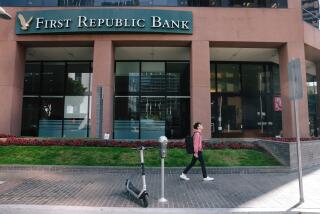Irving Throws in Towel, OKs New Bid by Bank of N.Y.
- Share via
NEW YORK — One day after losing a key court battle, Irving Bank Corp. surrendered Wednesday to Bank of New York Co., accepting a sweetened $1.4-billion bid that could end one of the nation’s longest-running takeover fights.
In a striking about-face, Irving Chairman Joseph A. Rice said he would recommend that the board of directors approve the merger and drop all pending lawsuits and anti-takeover defenses used to ward off Bank of New York’s year-long advances.
Rice also promised to move up his retirement plans and leave after the deal was completed.
A special board meeting has been set for Friday, although many banking experts have called that a formality.
“We’re 99% there. I believe the board will go along with Rice,” said Virginia Adair, a banking analyst with Drexel Burnham Lambert Inc.
Under the revised bid, Bank of New York would pay $15 in cash and 1.675 shares of its own stock for each of Irving’s 18.9 million common shares outstanding. It also included warrants valued at $5 toward the purchase of Bank of New York stock.
The entire deal is worth about $76 a share, or around $1.4 billion, about $200 million higher than the hostile offer. The previous bid had the same amount of cash but slightly less stock and did not include the warrants.
No ‘White Knight’
Irving shares jumped $3.75 to close at $73.50 on the New York Stock Exchange, while Bank of New York fell 75 cents to $34.125.
Neither side would comment on the turn of events leading to the tentative pact. However, banking analysts agreed Irving was forced to negotiate with its unwanted suitor in the absence of any “white knight” takeover partner and after losing Tuesday’s court rulings.
The appellate division of the New York State Supreme Court struck down a provision of Irving’s “poison pill” anti-takeover defense. The defense would have allowed all Irving shareholders--except a hostile suitor--to buy $400 worth of Irving shares for $200 if any suitor bought more than 20% of Irving stock without the support of Irving’s management. Such devices are intended to make unsolicited takeover bids prohibitively expensive.
Irving had vowed to appeal the ruling to the state’s highest court, the Court of Appeals. But some legal experts questioned whether that court would have considered the case since the appellate division’s decision was unanimous.
“The court ruling closed down one of their last possible escape routes,” said Mark Lynch, an analyst with Bear, Stearns & Co. “They had very few options left . . . unless they could find a white knight.”
Last spring, Milan-based Banca Commerciale Italiana SpA, offered to merge with Irving as part of a major restructuring of the New York bank. But it recently withdrew the bid after the Federal Reserve Board ruled the Italian government agency that owned most of Banca Commerciale had to supply separate financial information.
Nearly Doubles Size
The Fed already has given conditional approval for an Irving-Bank of New York merger.
A merger would nearly double Bank of New York’s size, vaulting it close to the top 10 of the nation’s largest banking companies. The two had a combined $47.8 billion in assets as of June 30.
Bank of New York, which owns 4.9% of Irving, had maintained since unveiling its takeover proposal on Sept. 25, 1987, that a merger would be a good fit since both banks have similar markets and services. While many analysts agreed, they also speculated that Bank of New York might have feared it would become a takeover target if a big West Coast or foreign bank decided to enter the New York market.
“It (the Irving merger) makes them an impossible takeover target,” Lynch said.
“They paid dearly for it (a merger) in both cost and disruption both companies have incurred.”
According to the merger proposal, all present directors of Irving would be invited to join Bank of New York’s board of directors, and all key personnel decisions would be made by a committee of directors made up of three directors of the Bank of New York and two current Irving directors.
More to Read
Sign up for Essential California
The most important California stories and recommendations in your inbox every morning.
You may occasionally receive promotional content from the Los Angeles Times.












